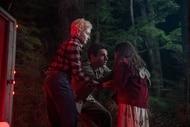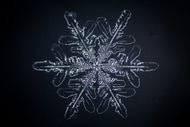The Dead Red Planet Part 2: Why did the waters of ancient Mars disappear?
Mars' magnetic field shut down, but why?

As I wrote in yesterday’s article, there is copious evidence that ancient Mars had a lot of water on it, including, perhaps, oceans, even if there are arguments about where those oceans might have been.
But ancient oceans or not, we know they’re gone now. What happened to them? Or a better question is, what physical events caused Mars to lose nearly all its water?
This is tied closely with what happened to the Martian atmosphere. Mars has very little air now, just 0.6 percent of Earth’s atmospheric pressure. That’s too low to support liquid water on the surface: Water boils are lower temperatures in thinner air — where I live in Colorado water boils at about 94° C (200°F). Mars must have had a much thicker atmosphere back in the day, three or more billion years ago, to be able to have standing liquid water on its surface without it all boiling away.
Where did it go?
The leading idea is that Mars had a decent magnetic field long ago, but something happened to switch it off. Magnetic fields act like force field, protecting a planet from the onslaught of fast subatomic particles blowing off the Sun, what we call the solar wind. Without a magnetic field to divert the wind around the planet, this constant stream sandblasts the atmosphere, eroding it away.
So what happened to the Martian magnetic field? Some new research turns up an interesting idea. Planets generate a magnetic field by moving charged particles around in their interior, generally through convection: Hot material rises and cooler stuff sinks. This motion, plus the planet’s spin, can create a magnetic field. Molten iron in Earth’s outer core does this for us.
Mars is different though. It’s thought that the Martian planetary core is mostly iron with sulfur mixed in. But recent measurements using seismic readings from NASA’s InSight lander show that the core is larger and lower density than first thought, which means it has more lighter elements in it, likely hydrogen.
So a team of scientists took a sample of material containing a likely mix of iron, sulfur, and iron, and in a lab squeezed it with a diamond press at the same time as heating it with a laser, to recreate pressures and temperatures in the core of Mars (link to paper). What they found is amazing: It naturally segregated itself into two distinct liquids, one rich in iron and sulfur, the other in iron and hydrogen.
Now imagine in you have a core made of this stuff. The iron/hydrogen material is lighter, and so will rise toward the surface while the denser material falls to the center. This is convection, and would create a magnetic field. The problem is, at some point the light stuff will all be floating at the top of the core and the heavier stuff at the bottom. When that process is done, convection stops. No more motion, so no more magnetic field.
That may have taken a billion years or thereabouts, which means three to four billion years ago the Martian magnetic field shut down, the solar wind started eroding the atmosphere, and some time later the air got so thin the surface could no longer support liquid water. Some of it was possibly absorbed into the planet and a lot of it was lost to space. What remained of the planet was more or less the cold, dry Mars we see today.
This is an interesting idea, but certainly not the last word. We know Mars had huge amount of volcanism early on, and it shut down for the most part long ago as well. Is this related? Is the Martian core really like this, with two separated layers? This is a cool hypothesis, but it’ll take a lot more testing to see how well it stands up to experiment.
Mars is a lot different today than it was eons ago. And if it can happen there, could it happen here as well? I’m not too worried we’ll go the way of the Red Planet any time soon — at the very least our hot core will keep generating a magnetic field for a long, long time — but given the scale of such a catastrophe I think we owe it to ourselves to understand better what happened to our little neighbor.






























